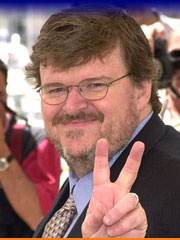I’ve mentioned a few times here already how brilliant and important I find Andrea Dworkin‘s work (in That Feminist Boy Thing (GT 2004/09/06) and Andrea Dworkin, Feminist Icon (GT 2001/07/03)); so I was glad to catch (through Feminist Blogs, no less!) feministe’s post today on Andrea and her critics. She quotes at length from an interview of Dworkin by Michael Moorcock, where Dworkin, inter alia, sets the record straight on the all intercourse is rape
slander (she doesn’t believe that and has never argued for it). There’s more too; read the whole thing and follow the links.
Ms. Lauren is, unfortunately, right when she describes Dworkin as one of the most vilified and misquoted women in recent history
. It’s worth taking the time to look at what she has actually had to say. So here’s your Dworkin for the day; it comes from an essay that’s been perhaps as important to me as anything else ever written: I Want a Twenty-Four-Hour Truce During Which There Is No Rape. It’s Dworkin at her best–a damning indictment and a call to arms, reflections on men and feminist activism that have literally changed my life, and the best argument for radical, unapologetic feminism that there is: a confrontation with the simple, heartbreaking, terrifyingly ordinary facts.
And if there would be a plea or a question or a human address in
that scream, it would be this: why are you so slow? Why are you so
slow to understand the simplest things; not the complicated
ideological things. You understand those. The simple things. The
cliches. Simply that women are human to precisely the degree and
quality that you are.
And also: that we do not have time. We women. We don’t have
forever. Some of us don’t have another week or another day to take
time for you to discuss whatever it is that will enable you to go
out into those streets and do something. We are very close to
death. All women are. And we are very close to rape and we are very
close to beating. And we are inside a system of humiliation from
which there is no escape for us. We use statistics not to try to
quantify the injuries, but to convince the world that those
injuries even exist. Those statistics are not abstractions. It is
easy to say, Ah, the statistics, somebody writes them up one way
and somebody writes them up another way.
That’s true. But I
hear about the rapes one by one by one by one by one, which is also
how they happen. Those statistics are not abstract to me. Every
three minutes a woman is being raped. Every eighteen seconds a
woman is being beaten. There is nothing abstract about it. It is
happening right now as I am speaking.
And it is happening for a simple reason. There is nothing complex
and difficult about the reason. Men are doing it, because of the
kind of power that men have over women. That power is real,
concrete, exercised from one body to another body, exercised by
someone who feels he has a right to exercise it, exercised in
public and exercised in private. It is the sum and substance of
women’s oppression.
It is not done 5000 miles away or 3000 miles away. It is done here
and it is done now and it is done by the people in this room as
well as by other contemporaries: our friends, our neighbors, people
that we know. Women don’t have to go to school to learn about
power. We just have to be women, walking down the street or trying
to get the housework done after having given one’s body in marriage
and then having no rights over it.
The power exercised by men day to day in life is power that is
institutionalized. It is protected by law. It is protected by
religion and religious practice. It is protected by universities,
which are strongholds of male supremacy. It is protected by a
police force. It is protected by those whom Shelley called the
unacknowledged legislators of the world
: the poets, the
artists. Against that power, we have silence.
On male supremacy and militarism:
I have heard in the last several years a great deal about the
suffering of men over sexism. Of course, I have heard a great deal
about the suffering of men all my life. Needless to say, I have
read Hamlet. I have read King Lear. I am
an educated woman. I know that men suffer. This is a new wrinkle.
Implicit in the idea that this is a different kind of suffering is
the claim, I think, that in part you are actually suffering because
of something that you know happens to someone else. That would
indeed be new.
But mostly your guilt, your suffering, reduces to: gee, we really
feel so bad. Everything makes men feel so bad: what you do, what
you don’t do, what you want to do, what you don’t want to want to
do but are going to do anyway. I think most of your distress is:
gee, we really feel so bad. And I’m sorry that you feel so bad–so
uselessly and stupidly bad–because there is a way in which this
really is your tragedy. And I don’t mean because you can’t cry. And
I don’t mean because there is no real intimacy in your lives. And
I don’t mean because the armor that you have to live with as men is
stultifying: and I don’t doubt that it is. But I don’t mean any of
that.
I mean that there is a relationship between the way that women are
raped and your socialization to rape and the war machine that
grinds you up and spits you out: the war machine that you go
through just like that woman went through Larry Flynt’s meat
grinder on the cover of Hustler. You damn well better
believe that you’re involved in this tragedy and that it’s your
tragedy too. Because you’re turned into little soldier boys from
the day that you are born and everything that you learn about how
to avoid the humanity of women becomes part of the militarism of
the country in which you live and the world in which you live. It
is also part of the economy that you frequently claim to protest.
And the problem is that you think it’s out there: and it’s not out
there. It’s in you. The pimps and the warmongers speak for you.
Rape and war are not so different. And what the pimps and the
warmongers do is that they make you so proud of being men who can
get it up and give it hard. And they take that acculturated
sexuality and they put you in little uniforms and they send you out
to kill and to die.
And, finally, on equality and bullshit excuses:
I want to talk to you about equality, what equality is and what it
means. It isn’t just an idea. It’s not some insipid word that ends
up being bullshit. It doesn’t have anything at all to do with all
those statements like: Oh, that happens to men too.
I name
an abuse and I hear: Oh, it happens to men too.
That is not
the equality we are struggling for. We could change our strategy
and say: well, okay, we want equality; we’ll stick something up the
ass of a man every three minutes.
You’ve never heard that from the feminist movement, because for us
equality has real dignity and importance–it’s not some dumb word
that can be twisted and made to look stupid as if it had no real
meaning.
You really ought to read the whole thing.


